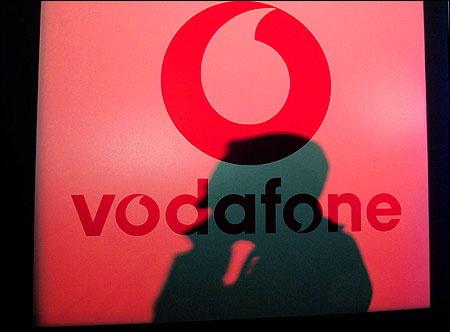
To avoid taxes, assessee resorted to complex structuring - especially from and through tax havens. In the process the thin line between evasion and avoidance became blurred like never before.
The implications of the Supreme Court judgment on the Vodafone case are disturbing if not frightening.
It has the calculated effect of legitimizing tax havens, sanctioning corporate structures that use tax havens to evade taxes and indirectly encourages money laundering and round tripping.
To amplify what is stated above, let me at the outset state the facts of this case in brief.
The case involves a holding company incorporated in a tax haven controlling an Indian subsidiary company carrying on the business of telecom through a maze of subsidiaries, most of which which are purely shell companies.
Click on NEXT for more...

The issue arose when exiting the Indian telecom business the shares of the holding company situate in a tax haven were sought to be sold by a non-resident to another instead of selling the shares of the Indian subsidiary.
In the process the transferor sought to divest control over the Indian subsidiary to the transferee.
The implications were manifold. But the crux of the issue was whether by a simple transfer of a single share abroad was the Indian business too "indirectly" transferred from the seller to the buyer?
Consequently, the next logical question to follow was whether the capital gains arising from such transactions be taxed in India purely on account of "underlying" Indian assets?
Click on NEXT for more...

Look through Vs looked at
To understand what has been stated above, it is necessary at this point in time to understand the very idea of structuring an international investment.
Needless to emphasize, such deals are blessed and dressed by international firms of accountants and lawyers taking advantage of the fact that world over development in law is always behind the curve.
That explains why an investment into a country - say Indonesia from US may be routed through a maze of companies located in Cayman Islands, Isle of man and finally through Singapore. Why such a contrived convoluted confusing arrangement?
The reasons for the same are obvious - Cayman Islands and others masks the identity of the ultimate owners while finally routing investments through Singapore is to take advantage of the tax treaties between Indonesia and Singapore.
Click on NEXT for more...

What is important to note here is that invariably each of these subsidiary companies holds portions of specific assets in the final destination, all of which makes divesting easier.
In short, exit in any foreign country is simultaneously planned at the time of entry! And this goes by the sexed up appellation of tax planning or investment structuring.
It is in this context one has to appreciate the Judgment of Hon'ble Supreme Court. Central to the argument of the Hon'ble Supreme Court, has been the principle of Westminster as propounded by the English Courts in 1935 wherein it was held "given that a document or transaction is genuine, the court cannot go behind it to some supposed underlying substance."
Click on NEXT for more...

In short, that implies courts need not be too concerned with the substance but only with the form of the transaction.
What is worrying analysts is that a legal proposition held in an alien country when it was a colonial power has been extrapolated into interpretation of tax laws of a sovereign country in entirely different times.
It is in this connection that the Hon'ble Supreme Court quoting judgments of various English Courts came to the conclusion that "it is the task of the Court to ascertain the legal nature of the transaction and while doing so it has to look at the entire transaction as a whole and not to adopt a dissecting approach."
Surely, a judgment of 1935 in England cannot be cast in stone for eternity. Yet the Supreme Court calls this a cardinal principle. Well in my considered opinion this interpretation is more suited to a colonial power and in innocent times.
Click on NEXT for more...

But as time passed by, innocence gave way and distrust grew between revenue and tax payer.
To avoid taxes, assessee resorted to complex structuring - especially from and through tax havens. In the process the thin line between evasion and avoidance became blurred like never before.
That in turn made tax laws complex. And complexity robbed precision in tax laws. That meant courts had to step in and "interpret" laws and given the overall context of the facts surrounding the case - technically called as "looked through" in contrast to the original Westminster idea of "look at."
Subsequently, in the eighties an attempt to re-look at the entire issue was made by the English courts in the Ramsay and Dawson cases whethe courts sought to overturn the "look at" principle as laid down by Westminster.
Click on NEXT for more...

In fact, the Hon'ble Supreme Court had held that "colourable device cannot be a part of tax planning and it is wrong to encourage the belief that it is honourable to avoid payment of tax by resorting to dubious methods."
This was the first attempt in India to depart from the Westminster principle. That was in 1985 in Mcdowell case where the courts wanted to look through a transaction instead of merely looking at one.
In short, this debate of "Looked at" versus "Looked Through" has been engaging the attention of the courts with courts for several decades now.
Click on NEXT for more...

But where is "Azadi"?
But any analysis of the Vodafone judgment is incomplete without revisiting the judgment of the Hon'ble Supreme Court in the Azadi Bachao Andolan case.
It may be recalled that by way of a circular in the mid-90s, the CBDT clarified the position of taxing capital gains of any investment made into India by a resident of Mauritius.
Furthermore, it clarified that such capital gains would be liable to tax in Mauritius (where the rate is zero).
This clarification ensured a free flow of foreign capital into the country from Mauritius. Naturally, FIIs began to invest into India, using this route without the fear of the taxman.
Click on NEXT for more...

As a fallout, tax consultants were laughing all their way to banks. Importantly, "ensuring" profits from our stock markets became a lucrative affair for many.
That meant subjecting our markets to repeated cycles of boom and doom. And anyone protesting against this arrangement is instantly labeled as ignorant.
As some overenthusiastic revenue officials began to raise inconvenient questions on the Mauritian investments, the CBDT issued a clarificatory circular in 2003 virtually promising "no questions" on investments into India and routed through Mauritius.
In short, the "Look At" principle as enunciated by the English Courts in Westminster case in the 30's made a remarkable comeback in India by 2003. Incensed with this circular some concerned citizens took the matter to courts.
Click on NEXT for more...

It is in this connection the Hon'ble Supreme court observed that many countries tolerate or encourage treaty shopping, even if it is unintended, improper or unjustified, for other non-tax reasons, unless it leads to a significant loss of tax revenues.
Moreover, it observed that several of them allow the use of their treaty network to attract foreign enterprises and offshore activities.
It went on to justify treaty shopping as an "incentive to attract scarce foreign capital or technology."
The court concluded "Despite the sound and fury of the respondents over the so-called abuse of treaty shopping, perhaps it may have been intended at the time when the Indo-Mauritius DTAA was entered into.
Whether it should continue, and, if so, for how long, is a matter which is best left to the discretion of the executive as it is dependent upon several economic and political considerations."
Click on NEXT for more...

Little did the court imagine as would have the Income-tax department that the Vodafone goose was cooked as early as 2003 by the action of the department itself.
Be that as it may, little did the nation, much less the Supreme Court or the Revenue realize that India too was becoming as someone put it colorfully - "a sponsored state."
Such a state is undeniably incapable of defining, much less protecting its self interests.
And as all these events are unfolding in india, we forget a crucial fact: investments from and to tax havens (and by extension treaty shopping) are prima facie suspect, sinister and inherently dangerous.
Unless we realise this, it would be very difficult in dealing with the present global financial architecture.
Click on NEXT for more...

Naturally, India is seen as a non-serious state - one that is running with the hounds and hunting with the hare (mixing the metaphor is deliberate) - where laws are deliberately kept nebulous.
Technically, the Supreme Court Judgment may well pass muster if and if we have a robust polity. Unfortunately we do not have one. Therein lies the rub.
That implies that the Hon'ble Supreme Court needs to necessarily step in where the government fails to meet its constitutional obligations.
Unless the Courts take a holistic approach of the matter we are in for arrangements that would constantly undermine the authority of the state.
Click on NEXT for more...

It is therefore a matter of great concern that the Hon'ble Supreme Court while advocating the "Look Through" principle in the extant case inadvertently advocated the "Look at" principle in the present case.
Given these constraints, the Hon'ble Supreme Court may well consider a review of its own judgment in the Azadi Bachao Andolan Case and decide at the primacy of "look through" instead of "look at" principle.
And only then would we render justice to the Vodafone case instead of resorting to ultra legal technicalities.